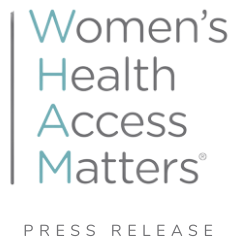
WHAM Launches #3Not30 Campaign to Call for Doubling the Funding for Women’s Health Research in the Next Three Years
Women’s Health Access Matters (WHAM) Announces Series of Events to Mark the 30th Anniversary of the NIH Revitalization Act of 1993 and Demand More Action to Improve Health Outcomes for Women
Contact: Marianne Foss-Skiftesvik, (203) 434-2383, marianne@whamnow.org
Greenwich, CT (January 19, 2023)—Women’s Health Access Matters (WHAM) kicks off its #3not30 campaign as part of a year-long effort to increase awareness about women’s health research and drive change with the goal of accelerating investment in sex-based research in the next three years. The campaign is the first of a series of activities WHAM is spearheading in recognition of the 30th Anniversary of the National Institutes of Health (NIH) Revitalization Act of 1993, a law which mandated that women and minorities should be included in all clinical trials and research which are funded by the NIH. WHAM will also host virtual and in-person dialogues throughout the year to explore what’s changed since this landmark legislation, what hasn’t, and how to ensure women’s health research receives the funding and support it deserves.
“While the Revitalization Act was a step forward for sex-based equity in health research, there has not been enough progress since this momentous event,” said WHAM Founder and CEO Carolee Lee. “For decades, women’s health has suffered as a result of under-investment in research. Women have also been forced to leave the workforce early to manage their own health or serve as caregivers for their loved ones. This is an economic issue that impacts everyone, and we can’t afford to ignore it. We must double the funding, which means adding $350 million to the budget for women’s health research in the next three years and getting a return to the economy of $14 billion, according to a study WHAM commissioned from the RAND Corporation. We cannot wait another thirty.”
The first WHAM Dialogue, “30 Years Later: How 1993 Shaped Women’s Health” is this Thursday, January 19th from 1-2 PM ET. This virtual event will spotlight a dynamic group of longtime women’s health advocates and leaders for a conversation that will offer the historical perspective of the 1993 Act, where we are today in reaching its mandates, and where we need to be to improve health and economic outcomes for women. The panel, which will be moderated by WHAM founder and CEO, Carolee Lee and allow for questions from the audience, will feature:
- Dr. Janine Clayton, NIH Associate Director for Research on Women’s Health and Director, Office of Research on Women’s Health;
- Dr. Marjorie Jenkins, Dean of U of SC School of Medicine Greenville and Chief Academic Officer for Prisma Health-Upstate;
- Dr. Hadine Joffe, Executive Director, Connors Center for Women’s Health and Gender Biology at Brigham and Women’s Hospital, Harvard Medical School; and
- Jenny Luray, Vice President of Strategy and Communications, Research!America, former Chief of Staff to Senator Barbara Mikulski
The subsequent events (full list below) will cover WHAM’s four areas of focus: heart health, autoimmune disease, brain health, and cancer. These diseases disproportionately affect women but are severely understudied. WHAM commissioned the RAND Corporation to conduct a series of studies that examine the impact of accelerating sex and gender–based health research on women, their families, and the economy. The WHAM Report found that only 4.5 percent of coronary artery research, 7 percent of rheumatoid arthritis research, 12 percent of Alzheimer’s research, and 15 percent of lung cancer research are allocated to projects focused specifically on women. Adding just $350 million in funding across these four disease areas would generate nearly $14 billion in economic returns that benefit everyone.
WHAM #3not30 Dialogues
- How 1993 Shaped Women’s Health: January 19th, 1-2pm ET
- Women’s Heart Health: February 9th, 1-2pm ET
- Autoimmune Disease: March 9th, 1-2pm ET
- Our Brains/Ourselves: April 13th, 1-2pm ET
- Cancer in Women: May 18th, 1-2pm ET
The event series will culminate with an in-person roundtable in Washington D.C. on June 13th and will include some of the leaders who originally helped create the 1993 Act – as well as those currently in office dedicated to women’s health. They will be joined by business leaders, investors, advocates, economists and academics to discuss how economic data can be used across sectors to accelerate investment in women’s health research and new business ventures.
“For thirty years, investment in women’s health research has lagged, which has resulted in poor health and economic outcomes for women, families, and the nation,” said Lee. “This is the reality despite the fact that women are 52 percent of the population, make up 50 percent of the workforce, control 60 percent of personal wealth, are responsible for 85 percent of consumer spending, and make 80 percent of health care decisions. Let’s seize this moment and use it as an opportunity to equitably fund the study of diseases that so clearly disproportionately and differently impact women. If we can achieve this as a country, we all stand to gain.”
For anyone interested in attending WHAM’s “How 1993 Shaped Women’s Health” virtual Dialogue, register here. To stay informed about future WHAM #3not30 Dialogues, please sign up for WHAM’s newsletter here. And, follow WHAM throughout the year on Twitter and LinkedIn to stay updated on other #3not30 activities and the latest in women’s health research.
###
About WHAM (Women’s Health Access Matters)
Women’s health is an economic issue we can’t afford to ignore. WHAM works to increase awareness of and funding for women’s health research by accelerating scientific discovery in women’s health in four primary disease verticals – autoimmune disease, brain health, cancer, and heart health. The WHAM Report quantifies the economic opportunity for investing in women’s health, looking across diseases that impact women differently and differentially, including coronary artery disease, rheumatoid arthritis, and Alzheimer’s disease. Learn more at www.thewhamreport.org and www.whamnow.org.
